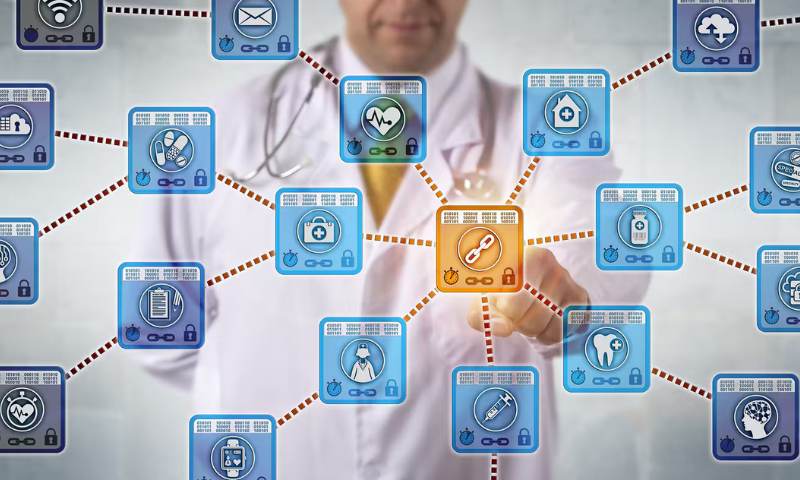Blockchain in Healthcare: Unlocking Revolutionary Patient Care Solutions
The Potential of blockchain in healthcare is no small buzz; it’s a game changer. Imagine a world where your health data is ironclad. No more fears of breaches or privacy mishaps. We are on the brink of that reality. Blockchain stands to overhaul everything from how we handle patient data to drug supply chains. It’s not just about keeping data safe; it’s about making our healthcare system work smarter, faster, and with greater trust. Join me as we dive into how blockchain’s strength is not just in securing data, but in unlocking doors to seamless care and unshakable trust in our health systems.
Blockchain as the Cornerstone of Modern Healthcare
Enhancing Security and Privacy for Patient Data
Healthcare faces big risks with data security. Every day, we hear about data theft. Hackers try to steal patient info. People worry about keeping their health details safe. Here’s where blockchain comes in. It’s a tech that makes data very hard to hack.
Blockchain uses a chain of blocks to store data. Each block links to the one before it using math. It’s like a chain no one can break. This keeps health records safe. It stops sneaky people from changing data. That’s important. Imagine someone changed your allergy info. That could hurt you.
Hospitals are like treasure chests. They hold lots of private info. Blockchain helps protect it. How? By giving each piece of data a unique code. Only certain people can see your health data. This means you have more control. You decide who sees your health info.
We can stop data breaches with blockchain. This keeps your info away from the wrong hands. Blockchain helps us follow the rules too, like with HIPAA. HIPAA sets rules on keeping your health info private. Blockchain can stop people from seeing or taking your info without asking.
People working together is a big deal in healthcare. With blockchain, we can share patient data easily but safely. This helps doctors work faster and better. If you’re sick, wouldn’t you want your doctors to have all your info fast? Blockchain does that.
We use blockchain for other things too. Like stopping fake drugs. Fake drugs can make people sick instead of better. Blockchain keeps track of real drugs. This way, we know where they come from. You get the right medicine.
Smart contracts are also cool. These are like deals stored in blockchain. They make sure hospital services stay top-notch. Everyone follows the same rules. This keeps your care good and fair. No one can cheat the system.
Your health data is like gold. It should stay safe. Blockchain puts a strong lock on that gold. Imagine your records flying safe in a superhero’s hands. That’s blockchain for you. No bad guys can touch it.
Healthcare has lots to gain from blockchain. It can cut costs by stopping fraud. It can make patient care better; you get care made just for you. It can lead to new ways to find cures faster. It changes how we handle health data. That’s all pretty awesome when you think about it.
So, blockchain is a big deal for health care today. It keeps our data safe, our care better, and our lives as patients safer. Everyone should know that their health info is in good hands. With blockchain, we can get there. It’s a strong friend for us in the fight to keep our health data locked tight.
Transforming Health Information Exchange and Interoperability
Streamlining Access to Health Records across Systems
We’re changing the game in healthcare. Imagine no more long waits for your medical info. By using blockchain technology in healthcare, we make sure different systems can talk to each other. So, patients get their health records fast. It’s like having a secret handshake that lets only the right people see your data.
Blockchain solutions in medicine are not just cool; they’re so useful. They keep track of who sees what, so your records stay safe. And with everything in one place, doctors get the full picture. They can make better decisions for your care, quick and easy.
Smart contracts for healthcare services are your new best friend. Picture a robot that never gets tired of checking for mistakes. That’s what smart contracts do. They make sure every step in your care follows the rules. This way, everyone knows what to expect, no surprises.
Let’s talk decentralized health information systems. This means no middle-man. Your data goes straight from A to B, with nothing lost along the way. And the best part? Your info stays yours. No one else can sneak a peek unless you say so. This helps stop people from getting to places they shouldn’t be.
Now, why does this matter? Well, health records are key. They need to be right at your fingertips, no matter where you go. If all hospitals and doctors used blockchain for secure health records, that dream becomes real. We could save lives by sharing data in a flash.
But wait, there’s more. The benefits of blockchain for patient data go beyond quick access. Every time you go to the doctor, they can see your history with a click. No mix-ups, no wasted time. With info moving so smooth, it could even cut costs. Imagine that! Keeping more money in your pocket just by making things run better.
And let’s not forget about interoperability in healthcare systems. This fancy word means the gear we use has to work well together. With blockchain, different bits and bobs can connect and share like best friends. It’s a big win for everyone.
Think about your medicine, too. Some bad guys make fake drugs, which can be really dangerous. We use blockchain to track every pill from start to finish. Drug traceability on blockchain means you can trust what you take. It’s like having a bodyguard for your medicine, making sure it’s the real deal.
Wrap up, smart contracts are your health’s backbone. They hold everything together, making sure every piece does its job just right. And work with blockchain in electronic medical records? That’s like putting your health details in a super-secure vault. Security incidents in healthcare? Not on our watch!
So, here we are, using blockchain to make sure your healthcare just keeps getting better. With secure records, quick info sharing, and a way to keep everyone honest, your care is set to become something truly special. And that’s what it’s all about – keeping you safe and sound.
Revolutionizing Supply Chain and Drug Authenticity
Bringing Transparency to the Medical Supply Chain
When getting medicine, how can we be sure it’s real and safe? Blockchain can help. This tech makes drug tracking better. It stops fake drugs from getting to patients. Hospitals, pharmacies, and you can see where your medicine comes from. This is done through a secure digital record.
How does blockchain track drugs? It uses a system no one can change dishonestly. Each step from making to delivery gets recorded. This way, only real drugs reach the shelves. Blockchain tech in healthcare keeps patients safe. It ensures what you take is what your doctor wants for you.
This is more than just keeping records. It’s about saving lives. Fake drugs can hurt or even kill. With blockchain, we can stop that. We make sure that the quality of drugs stays high. And the whole trip from the maker to you gets checked. This means every pill you take is just what you need.
Let’s break it down a bit. A drug starts at a factory. Every hand it passes through, blockchain checks. Think of it as a tech stamp, saying “yes, this is good”. This follows the drug all the way to you. Your health matters, and blockchain takes that seriously.
So, what are the benefits of blockchain for patient data? Simple. It keeps your info safe and sound. No bad actor can change it. Plus, your privacy stays protected. This is part of bigger moves in healthcare. Moves to keep you in control and feeling safe about your info.
Blockchain fixes many issues. Like healthcare data breaches prevention. These bad events expose your personal health info. But with blockchain, it’s tough for them to happen. And if they do, we know right away and can fix it fast.
Another cool part of blockchain is patient privacy and blockchain go hand in hand. Your health records on blockchain mean only you and your doc see them. It’s like a secret code for your health info. You pick who gets in on the secret. This builds trust. And in a world full of tech, trust is gold.
With blockchain solutions in medicine, we’re just scratching the surface. There’s so much more we can do. In clinical trials, doctors can manage data better. They can share info and make discoveries faster. For medicines, blockchain is like a bodyguard. It keeps the bad stuff out. For your health, it can mean the difference between getting better or not.
In the end, what does all this mean for you? Safer drugs, better health care, and peace of mind. When blockchain steps up, we all win. Meds you can trust, data that’s locked down, and bills that make sense. This is the future. And it’s a good one, all thanks to blockchain in healthcare.
Improving Healthcare Outcomes through Advanced Technologies
Integrating Blockchain into Electronic Medical Records
Blockchain can make health records safe and private. This means only the right eyes see your health info. With blockchain, we can stop people who should not look at your records from getting them.
This tech is like a safe where your health info is kept. Only you have the key, and you decide who else can look at it. This helps us share your health data safely when we need to. Like for research that can make health care better for everyone.
When we put your health data in a blockchain system, no one can change it by mistake or on purpose. So, doctors trust the info more. This trust can help them take better care of you.
Secure health records on blockchain help doctors work better too. Experts can look at lots of info from different places quickly and safely. They can then use this info to guess health problems before you even know you’re sick.
Doctors can also look at the info and learn over time. They might spot ways to stop people from getting sick.
We care about keeping your health info safe, not just because it’s private but also because it can help others. When your info is secure, you might say yes to sharing it. Researchers can then use it to figure out how to heal others or stop sickness from spreading.
Still, we want to make sure your info is yours. So we add rules for sharing it. These rules are called smart contracts. They make sure your info is used the right way and only for what you say okay to.
With blockchain, we also make sure that the info we use in research is really what it says it is. This is super important for making research strong and right.
Using blockchain for health records can do a lot for all of us. It helps keep your info away from folks who might want to steal it. And it helps doctors use that info to get better at healing us all.
It’s like putting your records in a vault no one can break into. Now that’s peace of mind, and it’s just the start of how blockchain can make healthcare better. But we’re not stopping there.
In the end, using blockchain in healthcare could mean less sickness and better health for people everywhere. That’s a goal worth working hard for. And as an expert in blockchain healthcare, I’m excited to be on the front lines of this change. It’s all about better care for you through smarter use of tech.
We’ve seen how blockchain can truly reshape healthcare. From guarding our health details to making sure we get real medicine, it’s clear: blockchain is key. It makes sharing health records safe, quick, and dependable. No more fake drugs, just real ones we can track from start to finish. And with all our health info in one secure spot, doctors can better predict and treat illness. So as we move ahead, let’s embrace this tech for our health. It’s smart, secure, and it saves lives.
Q&A :
What are the benefits of using blockchain in healthcare?
Blockchain technology in healthcare brings several benefits, including improved data security, enhanced patient privacy, increased interoperability amongst various healthcare systems, and more efficient tracking of medical records. It also offers a reliable platform for managing consent and authorization for data access, potentially leading to better compliance with regulations like HIPAA.
How could blockchain technology transform patient data management?
Blockchain could transform patient data management by establishing a decentralized ledger for secure, auditable, and transparent recording of health-related transactions. This innovation could enable real-time updates to patient records while maintaining their integrity and accessibility to authorized parties only. Furthermore, it could help reduce fraud, errors, and discrepancies in patient data.
Can blockchain improve the pharmaceutical supply chain?
Yes, blockchain has the potential to significantly improve the pharmaceutical supply chain. It can offer a highly secure and transparent tracking system that can help prevent counterfeit drugs from entering the market, ensure the integrity of pharmaceutical products, and improve recall processes. Blockchain can also facilitate better compliance with regulations and streamline the verification and validation processes across the supply chain network.
What role does blockchain play in enabling healthcare research?
Blockchain plays a significant role in healthcare research by creating a secure platform for sharing and verifying data. This can accelerate research efforts by ensuring that the data used is reliable and has not been tampered with. Additionally, blockchain can enable a more accurate and secure method of tracking consent for clinical trials, which is critical for participant privacy and adherence to ethical standards in research.
How does blockchain impact healthcare payments and insurance processes?
Blockchain could revolutionize healthcare payments and insurance processes by offering a secure, transparent, and efficient way to handle transactions and claims. Smart contracts, which are self-executing contracts with the terms directly written into code, could automate the claims process, reducing fraud and administrative costs. Moreover, blockchain’s distributed ledger technology can minimize disputes between parties by offering an immutable record of all transactions.


